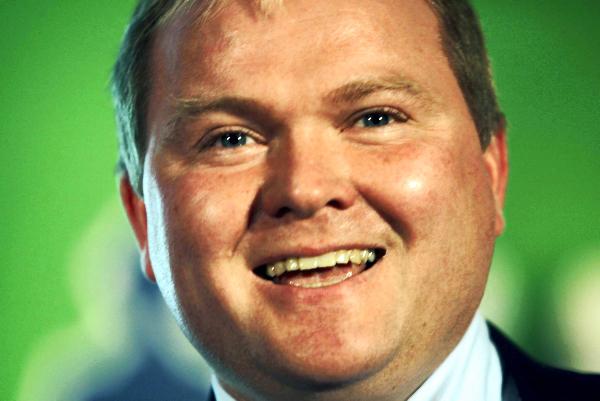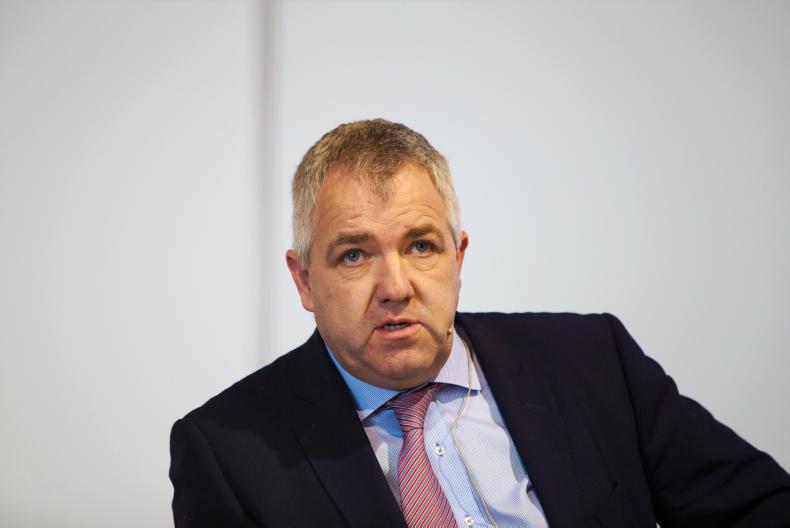The Henchy versus Dairygold case came to a dramatic halt in the High Court on Monday, when legal teams for both sides told Judge Daniel Herbert they had reached a settlement with no damages to be paid. The case was then struck out leaving the two sides to go their separate ways, but only one celebrating.
The case had adjourned on last Friday morning, after only approximately 30 minutes of hearing, examining Jerry Henchy’s personal finances. It was to resume on Tuesday morning. However, negotiations between the two legal teams took place on Friday, leading to an agreement on Saturday. The deal was approved by the Dairygold board on Saturday. On Monday morning Dairygold informed members of its general committee of the outcome.
The case was struck out. No damages are to be paid to the former chief exective. Dairygold informed the Court that any suggestion that it terminated the contract for Henchy’s services as CEO of Dairygold because of wrongdoing or financial impropriety on his part was without any foundation.Jerry Henchy confirmed that the board of Dairygold acted in good faith in coming to the decision to terminate his services as chief executive officer. Dairygold will pay €196,800, including VAT, to Henchy’s solicitors as a contribution to his legal costs.The outcome was a resounding victory for Dairygold. The case didn’t get beyond cross examination of Jerry Henchy. No witnesses were heard. The detailed cross examination didn’t even get as far as termination of his services.
However, the win was not bloodless as the co-op now faces significant legal costs. Preparation for the case will have cost Dairygold about €650,000 while the hearing was costing €50,000 per day. With the Court having sat for 18 days the co-op’s costs are likely to be north of €1.5m.
||PIC2||
The co-op board and management were united in the decision to contest all of Jerry Henchy’s charges. He was looking for damages approaching €9.5m (over 1c/litre of milk) and – if he had won - would have sought costs of over €1m. Yet, had Dairygold lost it would have been criticised for not settling the case earlier.
Now, the co-op can move on. Some of the events teased out in the Court are already 10 years past. The co-op is in good shape. It lost money on some of Jerry Henchy’s projects but the young chief executive took hard decisions, shedding or rationalising unprofitable divisions including meat processing. He achieved a solid price for the consumer foods division, sold to Kerry Group.
This week’s outcome is devastating for Jerry Henchy. He is now left with nothing from his years in the co-op except hard lessons. While his name is cleared of any financial wrongdoing, in reality no-one really ever suspected him of that anyway.
He has got no financial bonanza and is facing the tough task of trying to rebuild a career. But while Henchy gambled and lost in the years he was with Dairygold, no-one within the co-op will deny his courage, intelligence and confidence. He retained his sense of humour and optimism in the High Court in Dublin, even when under pressure.
The case was also eventful for another forceful personality – Cork farmer Vincent Buckley. He was a co-op chairman who stood up to a charismatic chief executive and said “No” when he didn’t agree with the direction being taken and proposals being made. Life would have been easier if he had acquiesced.
It’s no secret that Vincent Buckley felt that inaccurate accusations had been made against him in the Court and that he wanted to get into the witness box to reply. He didn’t get that opportunity. However, the putting of his evidence to Henchy, during cross examination by Dairygold senior counsel, was instrumental in bringing the case to a grinding halt.
Case chipped away
The case was halted because Jerry Henchy had fired his best shots in his opening evidence but then saw his case chipped away, piece by piece, under cross examination. Some key points of the case were:
He took his case for unfair dismissal against Dairygold. However, his payslips and P60s were read out in Court and showed that Reox paid his wages. Dairygold paid an agreed amount to Reox for his services as joint chief executive.Jerry Henchy’s stretched personal finances and his resulting inability to clear his farm trading account with the co-op featured large in the case. He was on high pay – some €900,000 in his final full year – but he was spending it just as quickly. He said he owed approximately €1m to his bank for borrowings used to buy his family home and a farm. The balance on his trading account peaked at over €150,000 and he was unable to clear the balance in either 2007 or 2008, as required under co-op rules.He maintained he was never asked to clear the escalating balance by year end in either 2007 or 2008 and that he had never committed to doing so. But Dairygold senior counsel Paul Gardiner outlined how this would be disputed by financial controller Michael Harte and then chairman Vincent Buckley in their evidence, while current chief executive Jim Woulfe, then head of agri-trading, had relevant evidence to give, too.Jerry Henchy maintained at all times that he had the financial strength to clear his Dairygold trading account. His preferred solution was to await a €150,000 rebate of tax from Revenue and to use that to clear his account. That eventually came in March 2009 – after his departure. But again, the Court heard that in his evidence Vincent Buckley was to present a different picture. He would say that a distraught Henchy had told him that he was unable to pay, that he had spent millions of euro (on what wasn’t specified) in the expectation of getting substantial payments from a Reox incentive scheme – which never materialised. Henchy responded last week that this was “lies and fabrication”.Jerry Henchy maintained that in advance of his services being terminated in January 2009 he did not think his failure to clear his farm account was a major issue. However, he acknowledged under cross examination that it was discussed by the co-op’s auditors Deloitte and Touche when they were auditing the co-op’s accounts. He was aware that under company law the auditors had to disclose management’s trading with the business and would have had to disclose if an account such as his became “non-performing” and there was a risk of bad debt.The Court heard how the issue of a senior manager’s farm account was made public at the co-op’s 2008 AGM. The situation was difficult for a co-op which had “many times” sued farmers for failure to pay lesser amounts owed for farm inputs.Under cross examination Henchy accepted that chairman Vincent Buckley and financial controller Michael Harte acted in the interest of his privacy, and, in the interest of the business, when they moved his trading account off the front-line IT system. The case was to resume on Tuesday with Jerry Henchy due to produce details of all his personal accounts, to help determine whether he was or was not in a position in 2007 and 2008 to clear his Dairygold trading account. The cross examination dealt in some detail with the co-op’s December 2006 election for chairman which led to claims of interference by the chief executive. Again, the Court was told that witnesses would give evidence flatly contradicting that of Henchy.Under questioning by Dairygold senior counsel Paul Gardiner, Henchy was, on a number of occasions, forced to withdraw or change his earlier, direct evidence. Gardiner used these occasions to question the reliability of Henchy’s recollection of all events.
The Henchy versus Dairygold case came to a dramatic halt in the High Court on Monday, when legal teams for both sides told Judge Daniel Herbert they had reached a settlement with no damages to be paid. The case was then struck out leaving the two sides to go their separate ways, but only one celebrating.
The case had adjourned on last Friday morning, after only approximately 30 minutes of hearing, examining Jerry Henchy’s personal finances. It was to resume on Tuesday morning. However, negotiations between the two legal teams took place on Friday, leading to an agreement on Saturday. The deal was approved by the Dairygold board on Saturday. On Monday morning Dairygold informed members of its general committee of the outcome.
The case was struck out. No damages are to be paid to the former chief exective. Dairygold informed the Court that any suggestion that it terminated the contract for Henchy’s services as CEO of Dairygold because of wrongdoing or financial impropriety on his part was without any foundation.Jerry Henchy confirmed that the board of Dairygold acted in good faith in coming to the decision to terminate his services as chief executive officer. Dairygold will pay €196,800, including VAT, to Henchy’s solicitors as a contribution to his legal costs.The outcome was a resounding victory for Dairygold. The case didn’t get beyond cross examination of Jerry Henchy. No witnesses were heard. The detailed cross examination didn’t even get as far as termination of his services.
However, the win was not bloodless as the co-op now faces significant legal costs. Preparation for the case will have cost Dairygold about €650,000 while the hearing was costing €50,000 per day. With the Court having sat for 18 days the co-op’s costs are likely to be north of €1.5m.
||PIC2||
The co-op board and management were united in the decision to contest all of Jerry Henchy’s charges. He was looking for damages approaching €9.5m (over 1c/litre of milk) and – if he had won - would have sought costs of over €1m. Yet, had Dairygold lost it would have been criticised for not settling the case earlier.
Now, the co-op can move on. Some of the events teased out in the Court are already 10 years past. The co-op is in good shape. It lost money on some of Jerry Henchy’s projects but the young chief executive took hard decisions, shedding or rationalising unprofitable divisions including meat processing. He achieved a solid price for the consumer foods division, sold to Kerry Group.
This week’s outcome is devastating for Jerry Henchy. He is now left with nothing from his years in the co-op except hard lessons. While his name is cleared of any financial wrongdoing, in reality no-one really ever suspected him of that anyway.
He has got no financial bonanza and is facing the tough task of trying to rebuild a career. But while Henchy gambled and lost in the years he was with Dairygold, no-one within the co-op will deny his courage, intelligence and confidence. He retained his sense of humour and optimism in the High Court in Dublin, even when under pressure.
The case was also eventful for another forceful personality – Cork farmer Vincent Buckley. He was a co-op chairman who stood up to a charismatic chief executive and said “No” when he didn’t agree with the direction being taken and proposals being made. Life would have been easier if he had acquiesced.
It’s no secret that Vincent Buckley felt that inaccurate accusations had been made against him in the Court and that he wanted to get into the witness box to reply. He didn’t get that opportunity. However, the putting of his evidence to Henchy, during cross examination by Dairygold senior counsel, was instrumental in bringing the case to a grinding halt.
Case chipped away
The case was halted because Jerry Henchy had fired his best shots in his opening evidence but then saw his case chipped away, piece by piece, under cross examination. Some key points of the case were:
He took his case for unfair dismissal against Dairygold. However, his payslips and P60s were read out in Court and showed that Reox paid his wages. Dairygold paid an agreed amount to Reox for his services as joint chief executive.Jerry Henchy’s stretched personal finances and his resulting inability to clear his farm trading account with the co-op featured large in the case. He was on high pay – some €900,000 in his final full year – but he was spending it just as quickly. He said he owed approximately €1m to his bank for borrowings used to buy his family home and a farm. The balance on his trading account peaked at over €150,000 and he was unable to clear the balance in either 2007 or 2008, as required under co-op rules.He maintained he was never asked to clear the escalating balance by year end in either 2007 or 2008 and that he had never committed to doing so. But Dairygold senior counsel Paul Gardiner outlined how this would be disputed by financial controller Michael Harte and then chairman Vincent Buckley in their evidence, while current chief executive Jim Woulfe, then head of agri-trading, had relevant evidence to give, too.Jerry Henchy maintained at all times that he had the financial strength to clear his Dairygold trading account. His preferred solution was to await a €150,000 rebate of tax from Revenue and to use that to clear his account. That eventually came in March 2009 – after his departure. But again, the Court heard that in his evidence Vincent Buckley was to present a different picture. He would say that a distraught Henchy had told him that he was unable to pay, that he had spent millions of euro (on what wasn’t specified) in the expectation of getting substantial payments from a Reox incentive scheme – which never materialised. Henchy responded last week that this was “lies and fabrication”.Jerry Henchy maintained that in advance of his services being terminated in January 2009 he did not think his failure to clear his farm account was a major issue. However, he acknowledged under cross examination that it was discussed by the co-op’s auditors Deloitte and Touche when they were auditing the co-op’s accounts. He was aware that under company law the auditors had to disclose management’s trading with the business and would have had to disclose if an account such as his became “non-performing” and there was a risk of bad debt.The Court heard how the issue of a senior manager’s farm account was made public at the co-op’s 2008 AGM. The situation was difficult for a co-op which had “many times” sued farmers for failure to pay lesser amounts owed for farm inputs.Under cross examination Henchy accepted that chairman Vincent Buckley and financial controller Michael Harte acted in the interest of his privacy, and, in the interest of the business, when they moved his trading account off the front-line IT system. The case was to resume on Tuesday with Jerry Henchy due to produce details of all his personal accounts, to help determine whether he was or was not in a position in 2007 and 2008 to clear his Dairygold trading account. The cross examination dealt in some detail with the co-op’s December 2006 election for chairman which led to claims of interference by the chief executive. Again, the Court was told that witnesses would give evidence flatly contradicting that of Henchy.Under questioning by Dairygold senior counsel Paul Gardiner, Henchy was, on a number of occasions, forced to withdraw or change his earlier, direct evidence. Gardiner used these occasions to question the reliability of Henchy’s recollection of all events. 










SHARING OPTIONS